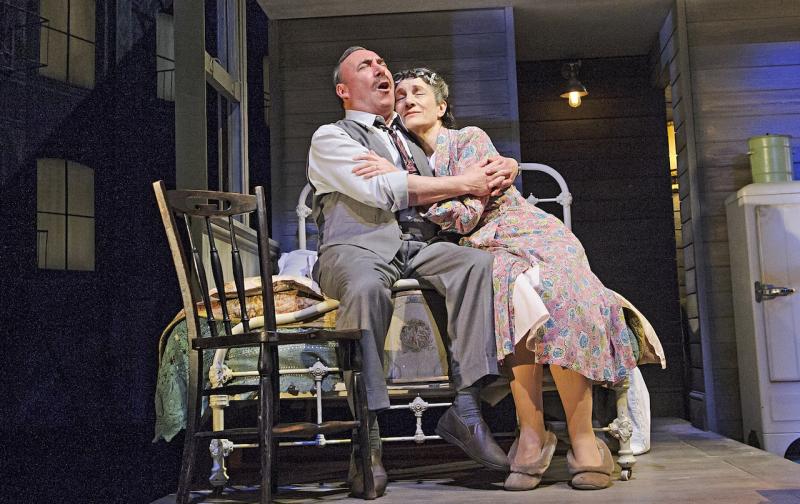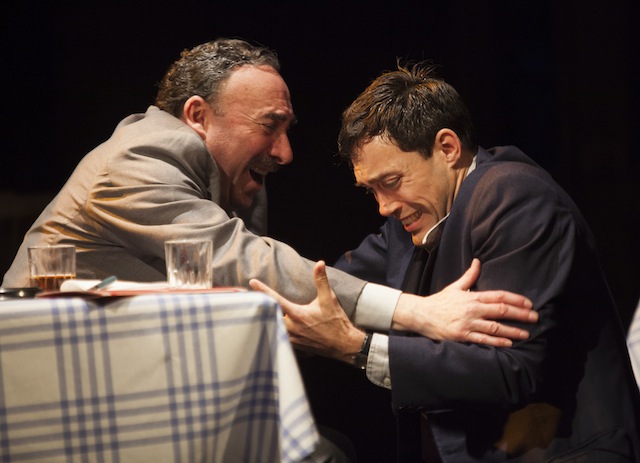Death of a Salesman, Noël Coward Theatre | reviews, news & interviews
Death of a Salesman, Noël Coward Theatre
Death of a Salesman, Noël Coward Theatre
Stunning performances make Miller's masterpiece burn

We’ve not been short of memorable London productions of Arthur Miller’s best known works. Ivo van Hove’s triple Olivier award-winning A View from the Bridge, which transferred to the Wyndham’s Theatre from the Young Vic earlier this year, and the Old Vic’s The Crucible, directed last year by Yaël Farber, were two exceptional productions. And now we have the seminal play of the 20th century.
The smaller stage and more intimate auditorium of the Noël Coward Theatre immediately gives a more focused energy to Gregory Doran’s production. There’s an intensity that just occasionally flagged on the huge thrust stage of the main Stratford theatre. With the exception of Harriet Walter, whose performance at Stratford was already pretty much pitch perfect as the pragmatic but put-upon Linda Loman, the rest of the cast seem to physically inhabit their characters with just that bit more ease and conviction.
Antony Sher’s labile and voluble Willy Loman suffers no stiff gear changes, as we saw in the hesitant opening scenes of its earlier incarnation, and Alex Hassell’s Biff, whose unsettledness and longing for nature and open spaces echoes the “temporariness” and longings of his father, conveys a greater sense of pent-up, self-mocking rage. When he tells Happy (Sam Marks) that “Maybe I ought to get married,” he emits a short, bitter laugh. Finding himself once again sharing a bedroom with his younger brother in their childhood home, this is just one more dream that mocks and eludes him.
There’s a depth she brings to a role which gives Linda almost no interior life
Unable to connect with the world or to one another, here are three lost “temporary” men, whose manhood is challenged on one side by the automaton Ben (Guy Paul), Willy’s ruthless and money-making-machine older brother, and Charley (Joshua Richards), Willy’s easy-going, jocular neighbour who keeps Willy financially afloat but who is continually rebuffed by him, despite Willy's emotional neediness. When Willy’s pride reasserts itself in their scenes together, it does so with displays of rattled fist-shaking and challenges to a fight. Sher’s exhausted, corpulent 60-year-old acts every year his age. Meanwhile, Charley’s son Bernard (Brodie Ross) is held up as the exemplum of the lessons and values Willy failed to instill in his own sons.
Whereas Biff's disillusionment is shaped by genuine insight, Hap echoes that other facet of his father’s character – his self-delusion. Within the fluid, dream-like structure of the play, which sees Willy’s interior and exterior worlds collapse into each other, the two actors playing Willy’s boys become scampering adolescents, showing off their sporting prowess in the backyard, idolising their father like two dopey puppies and eagerly lapping up his self-aggrandisements. And there are laughs too, particularly when Hassell's Biff enacts a series of cheesy sports-hero poses as the spot-lit, all-American football star conjured up by his father’s meandering mind.
 Though not quite its lynchpin, Linda is the play’s emotionally still centre. And it’s a role that Walter, with her deliciously broad Brooklyn accent, seems to make so much larger than it appears on the page. There’s a depth she brings to a part that gives Linda almost no interior life. When Walter manages to pull off the line, “Attention, attention, must be finally paid to such a person” – hardly the easiest to speak – there’s a rawness in her commanding delivery. This time Sher matches her in the highly charged, high-emotions stakes. Towards the end, there are plenty of sniffles as Willy and Biff engage in a kind of desperate fight/hug/collapse (pictured above, in an earlier scene).
Though not quite its lynchpin, Linda is the play’s emotionally still centre. And it’s a role that Walter, with her deliciously broad Brooklyn accent, seems to make so much larger than it appears on the page. There’s a depth she brings to a part that gives Linda almost no interior life. When Walter manages to pull off the line, “Attention, attention, must be finally paid to such a person” – hardly the easiest to speak – there’s a rawness in her commanding delivery. This time Sher matches her in the highly charged, high-emotions stakes. Towards the end, there are plenty of sniffles as Willy and Biff engage in a kind of desperate fight/hug/collapse (pictured above, in an earlier scene).
Given the imaginative staging of A View from the Bridge, which set the action in a kind of sealed-off, minimalist hothouse, the naturalistic setting here (designed by Stephen Brimson Lewis) seems a little humdrum, a little predictable, perhaps a little dated. But here the play’s realism is weighted against its stylised expressionism and comes down on the side of the former. It’s the lighting, which makes the backdrop tenements translucent with a hint of green during scenes of the imagined past, and the music – lyrical and reminiscent of the vast plains of America in the opening scene (a motif that recurs when we hear how Willy’s father, himself a travelling salesman, made and sold flutes in the Midwest) and jazzier in the later New York scenes – which are left to work their magic. Working their magic, too, are of course the stunning central performances.
rating
Explore topics
Share this article
Add comment
The future of Arts Journalism
You can stop theartsdesk.com closing!
We urgently need financing to survive. Our fundraising drive has thus far raised £49,000 but we need to reach £100,000 or we will be forced to close. Please contribute here: https://gofund.me/c3f6033d
And if you can forward this information to anyone who might assist, we’d be grateful.

Subscribe to theartsdesk.com
Thank you for continuing to read our work on theartsdesk.com. For unlimited access to every article in its entirety, including our archive of more than 15,000 pieces, we're asking for £5 per month or £40 per year. We feel it's a very good deal, and hope you do too.
To take a subscription now simply click here.
And if you're looking for that extra gift for a friend or family member, why not treat them to a theartsdesk.com gift subscription?
more Theatre
 Little Brother, Soho Theatre review - light, bright but emotionally true
This Verity Bargate Award-winning dramedy is entertaining as well as thought provoking
Little Brother, Soho Theatre review - light, bright but emotionally true
This Verity Bargate Award-winning dramedy is entertaining as well as thought provoking
 The Unbelievers, Royal Court Theatre - grimly compelling, powerfully performed
Nick Payne's new play is amongst his best
The Unbelievers, Royal Court Theatre - grimly compelling, powerfully performed
Nick Payne's new play is amongst his best
 The Maids, Donmar Warehouse review - vibrant cast lost in a spectacular-looking fever dream
Kip Williams revises Genet, with little gained in the update except eye-popping visuals
The Maids, Donmar Warehouse review - vibrant cast lost in a spectacular-looking fever dream
Kip Williams revises Genet, with little gained in the update except eye-popping visuals
 Ragdoll, Jermyn Street Theatre review - compelling and emotionally truthful
Katherine Moar returns with a Patty Hearst-inspired follow up to her debut hit 'Farm Hall'
Ragdoll, Jermyn Street Theatre review - compelling and emotionally truthful
Katherine Moar returns with a Patty Hearst-inspired follow up to her debut hit 'Farm Hall'
 Troilus and Cressida, Globe Theatre review - a 'problem play' with added problems
Raucous and carnivalesque, but also ugly and incomprehensible
Troilus and Cressida, Globe Theatre review - a 'problem play' with added problems
Raucous and carnivalesque, but also ugly and incomprehensible
 Clarkston, Trafalgar Theatre review - two lads on a road to nowhere
Netflix star, Joe Locke, is the selling point of a production that needs one
Clarkston, Trafalgar Theatre review - two lads on a road to nowhere
Netflix star, Joe Locke, is the selling point of a production that needs one
 Ghost Stories, Peacock Theatre review - spirited staging but short on scares
Impressive spectacle saves an ageing show in an unsuitable venue
Ghost Stories, Peacock Theatre review - spirited staging but short on scares
Impressive spectacle saves an ageing show in an unsuitable venue
 Hamlet, National Theatre review - turning tragedy to comedy is no joke
Hiran Abeyeskera’s childlike prince falls flat in a mixed production
Hamlet, National Theatre review - turning tragedy to comedy is no joke
Hiran Abeyeskera’s childlike prince falls flat in a mixed production
 Rohtko, Barbican review - postmodern meditation on fake and authentic art is less than the sum of its parts
Łukasz Twarkowski's production dazzles without illuminating
Rohtko, Barbican review - postmodern meditation on fake and authentic art is less than the sum of its parts
Łukasz Twarkowski's production dazzles without illuminating
 Lee, Park Theatre review - Lee Krasner looks back on her life as an artist
Informative and interesting, the play's format limits its potential
Lee, Park Theatre review - Lee Krasner looks back on her life as an artist
Informative and interesting, the play's format limits its potential
 Measure for Measure, RSC, Stratford review - 'problem play' has no problem with relevance
Shakespeare, in this adaptation, is at his most perceptive
Measure for Measure, RSC, Stratford review - 'problem play' has no problem with relevance
Shakespeare, in this adaptation, is at his most perceptive
 The Importance of Being Earnest, Noël Coward Theatre review - dazzling and delightful queer fest
West End transfer of National Theatre hit stars Stephen Fry and Olly Alexander
The Importance of Being Earnest, Noël Coward Theatre review - dazzling and delightful queer fest
West End transfer of National Theatre hit stars Stephen Fry and Olly Alexander

Comments
Yes agreed re the comparison
Yes agreed re the comparison with 'A View from the Bridge' - 'Death of a Salesman' seemed a little more muted in many ways. Still an amazing play though.